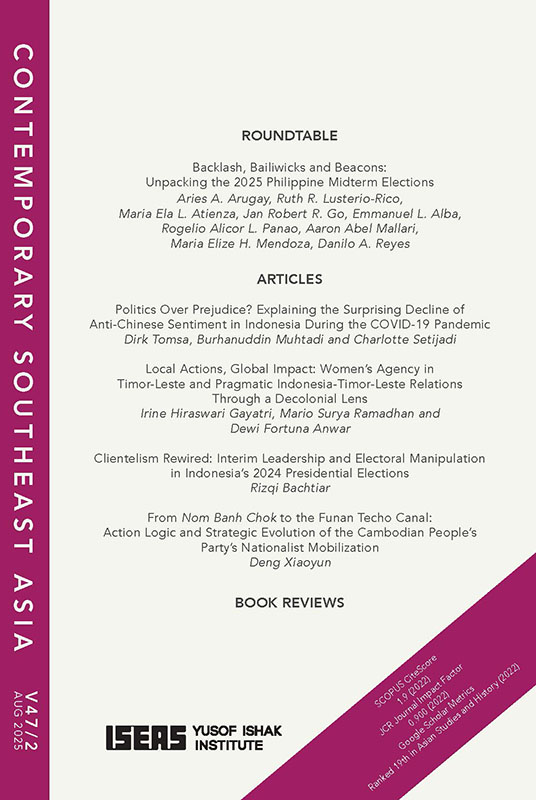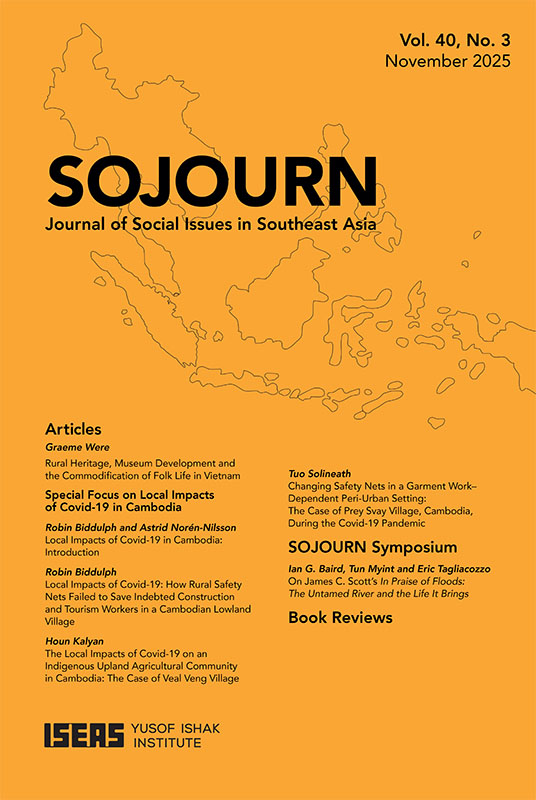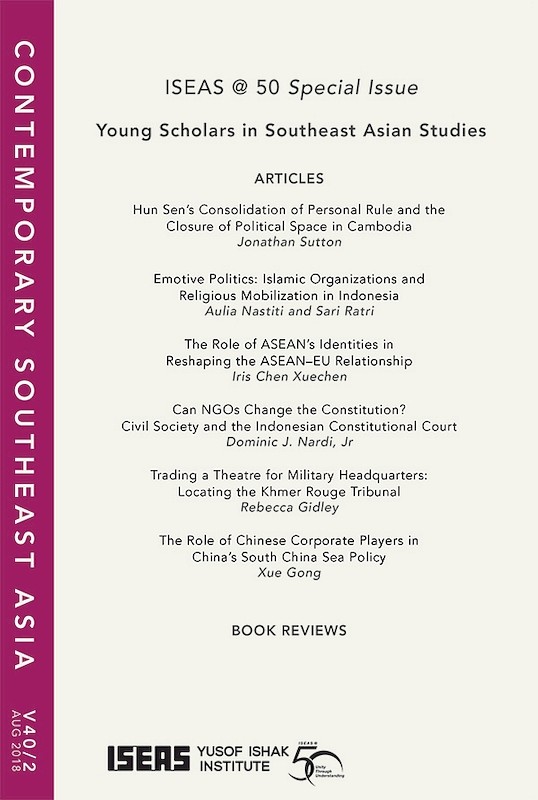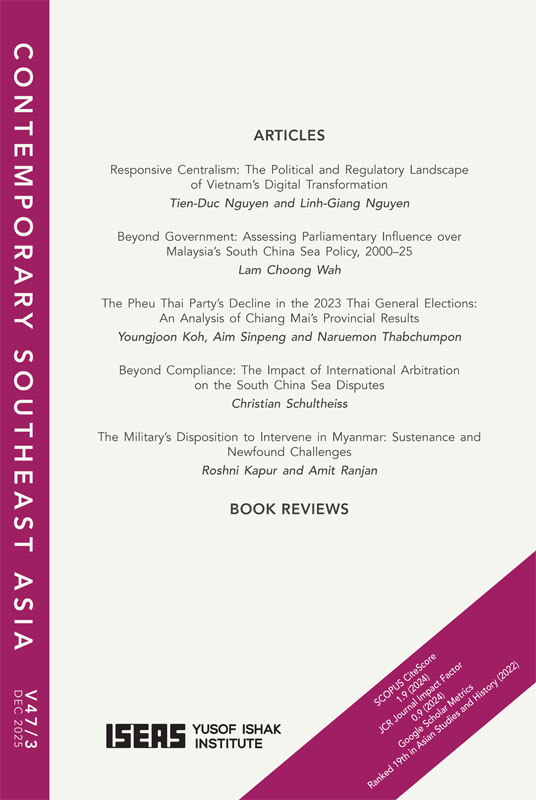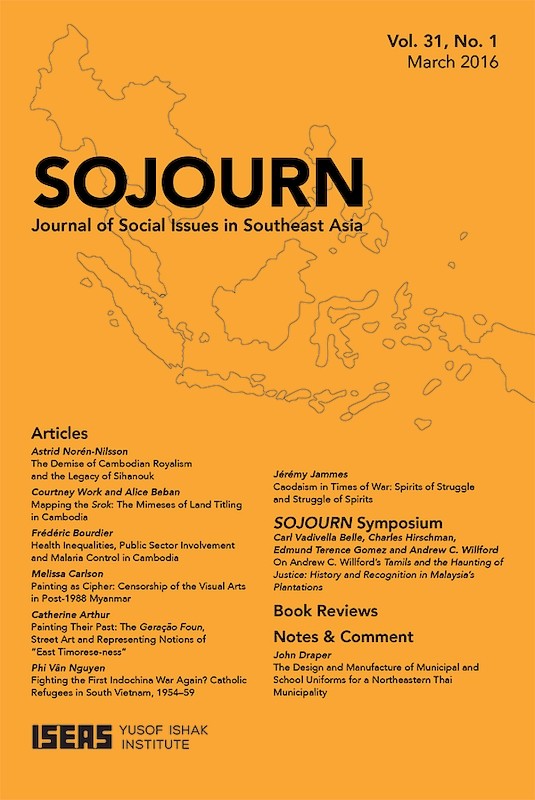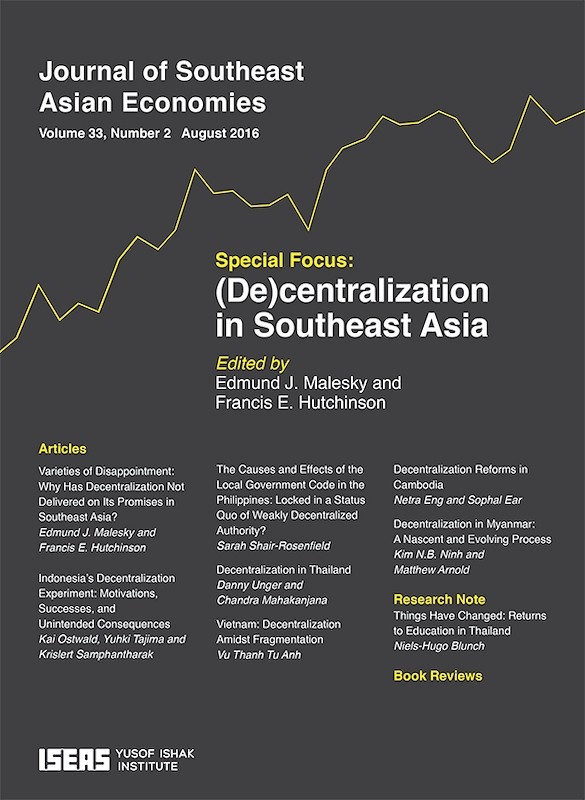Contemporary Southeast Asia Vol. 43/2 (August 2021). Special issue: The Cambodian People’s Party’s Turn to Hegemonic Authoritarianism: Strategies and Envisaged Futures
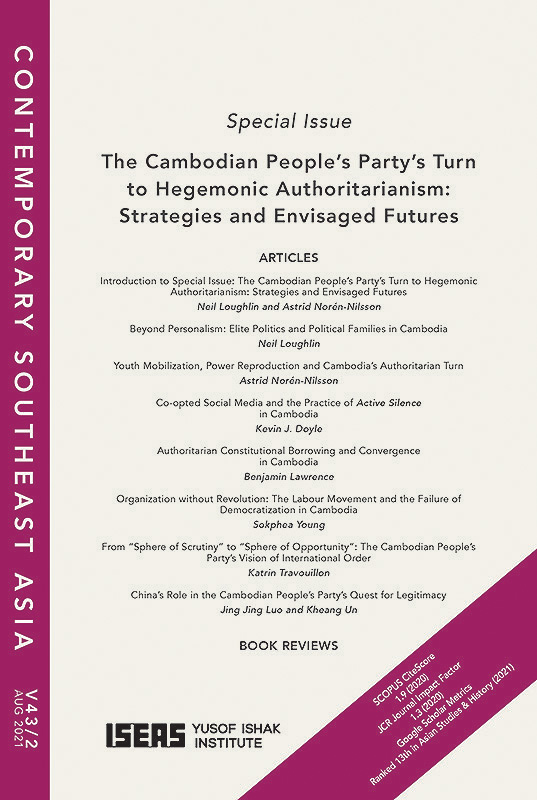
Date of publication:
August 2021
Publisher:
ISEAS – Yusof Ishak Institute
Number of pages:
214
Code:
CS43/2
Contents
-
Contemporary Southeast Asia Vol. 43/2 (August 2021). Special issue: The Cambodian People’s Party’s Turn to Hegemonic Authoritarianism: Strategies and Envisaged Futures
[Whole Publication, ISSN: 1793284X] -
Preliminary pages
- ARTICLES
-
1. Introduction to Special Issue: The Cambodian People’s Party’s Turn to Hegemonic Authoritarianism: Strategies and Envisaged Futures, by Neil Loughlin, Astrid Norén-Nilsson, authors
-
2. Beyond Personalism: Elite Politics and Political Families in Cambodia, by Neil Loughlin, author see abstractThe regime in Cambodia has been increasingly described as personalist, with power centralized in the hands of its long-serving leader, Prime Minister Hun Sen. Recent scholarship has described the ways he has, over time, concentrated power in key institutions for his political survival. The prime minister’s advancing age, however, has raised questions over the future of the regime without him at the helm. This article analyses the process of regime management and the ongoing succession planning in Cambodia, thereby providing a nuanced account of a leader who is not unassailable or unresponsive to the needs of other elites but must continue to manage factional and other interests within his ruling coalition to an extent not captured in the current personalist literature on Cambodia. The evidence for this may be observed in Hun Sen’s attempts to manage a dynastic transition on two fronts: to ensure the pre-eminence of his family among Cambodia’s elites, while maintaining a regime organized against the broader interests outside his coalition. This exemplifies the twin pressures facing all autocrats, and in Cambodia it exposes the state-society schism embedded in the process of state and regime-making since 1979 that continues to shape its politics.
-
3. Youth Mobilization, Power Reproduction and Cambodia’s Authoritarian Turn, by Astrid Norén-Nilsson, author see abstractIn parallel with the crackdown on independent civil society, Cambodia’s shift to hegemonic authoritarianism has been accompanied by the increased prominence of youth-focused mass organizations. These organizations are formally non-governmental organizations but have close links with the ruling Cambodian People’s Party (CPP). Engaging with recent literature on how expanding political participation may serve to constrain contestation, this article analyses how these youth initiatives contribute to authoritarian resilience and innovation in Cambodia. The article examines the different opportunities that these organizations offer different segments of the Cambodian population, and the benefits that the governing elite accrue from their participation. Processes of elite formation, including to what extent these organizations enable elite reproduction versus the injection of new blood into the elite, are evaluated. From this perspective, evolving relations between civil society, the government and the CPP are assessed. The article aims to add to our knowledge of the changing architecture of civil society, youth politics, elite circulation and integration, and the loci and transitions of power in connection with Cambodia’s authoritarian turn.
-
4. Co-opted Social Media and the Practice of Active Silence in Cambodia, by Kevin J. Doyle, author see abstractCambodia’s swing to hegemonic authoritarianism has been accompanied by a related transformation in the field of information and communication: the co-optation of digital platforms to spread a newly crafted hegemonic discourse. This article shows that Prime Minister Hun Sen has co-opted social media to promote a new, more emotive, online persona in tandem with the projection of a discourse that justifies his right to rule unchallenged. Echoes of Hun Sen’s social media repertories are also evident in the online activities of his son Hun Manet, which may speak to a transference of symbolic capital prior to a possible succession in the future. At the same time, everyday users of social media in Cambodia engage in counter-hegemonic practices by valuing social media for affording access to sources of news and information not controlled by the ruling Cambodian People’s Party. Yet, they also practise an active silence regarding their holding of dissenting political sentiments. This study thus also draws attention to a critical civic awareness growing among the Cambodian public at a time of deepening authoritarianism—a contradiction that may contain the seeds of new political subjectivities and future contestations to Hun Sen’s hegemonic rule.
-
5. Authoritarian Constitutional Borrowing and Convergence in Cambodia, by Benjamin Lawrence, author see abstractAlthough control over Cambodia’s legal system has long been central to the perpetuation of the political hegemony of the Cambodian People’s Party (CPP), the weaponization of law in Cambodia has intensified in recent years. A feature of this development has been an increased tendency to borrow directly from other illiberal or autocratic jurisdictions. For example, Thailand was explicitly cited as the inspiration for the 2017 amendments to the Law on Political Parties, which precipitated the dissolution of the opposition Cambodian National Rescue Party that same year. The introduction of lèse-majesté offences to the Criminal Code in 2018 appears to be another prominent instance of borrowing from Thai law although it was not explicitly recognized as such. An amendment to Article 49 of the Cambodian Constitution which prohibits actions by all citizens that “affect the interests” of the nation or its citizens appears to be borrowed from China’s constitution. Finally, the Supreme Council for Consultation and Recommendation, created under the supervision of the Council of Ministers, resembles China’s People’s Political Consultative Conference. By analysing legal change and institutional innovation in Cambodia from a comparative perspective, this article demonstrates how Cambodia’s hegemonic turn has been reflected in the character of legal changes the CPP has pursued, as well as in the jurisdictions from which it appears to have drawn inspiration.
-
6. Organization without Revolution: The Labour Movement and the Failure of Democratization in Cambodia, by Sokphea Young, author see abstractIt is postulated that collective labour movements responding to demands for political reform, rather than to workplace demands, are key actors in democratic mobilization. Contrary to this proposition, this article draws on evidence from labour movements and related social allies in Cambodia to examine why they fail to mobilize in support of democratic revolutions. This article argues that labour movements in Cambodia do not “burst onto the political scene” because they possess weak social and institutional alliances with political actors, such as opposition parties and other interest groups, to establish a democratic revolution. The capacity of labour movements to transform “democratic intent” into “democratic action” is thus hindered by the ability of authoritarian rulers and their coalitions, including business elites, to tightly control and co-opt alliances of labour movements designed to put pressure on the ruling regime. In essence, capitalist development does not strengthen the capacity of excluded labour groups but co-opts them to break down the opposition alliance and thus prevent democratization.
-
7. From “Sphere of Scrutiny” to “Sphere of Opportunity”: The Cambodian People’s Party’s Vision of International Order, by Katrin Travouillon, author see abstractCambodia’s changing relations with the so-called “international community”, including the European Union’s decision to partially withdraw Cambodia’s preferential trade benefits and the closure of the Swedish Embassy in 2020, have given rise to concerns about Cambodia’s impending break with the West and tilt towards China. This article examines how Cambodian Prime Minister Hun Sen has negotiated public concerns about the adjustments in international support from donor countries and institutions, particularly following the 2018 elections. Through an examination of his speeches since the early 2000s, this article argues that one of Hun Sen’s key rhetorical strategies is his sustained engagement with an inherent paradox of “the international community”: the possibility for actors to become morally excluded from, but remain structurally integrated in, the international community. Six themes he thereby developed inform his nationalist message about the advantages arising from the changing nature of Cambodia’s international cooperation, in which Cambodia is able to engage the world on an equal footing with other countries while free of any constraints imposed by its international donors. In this vision, the international order becomes a “sphere of opportunity”, rather than a “sphere of scrutiny”, for Cambodia.
-
8. China’s Role in the Cambodian People’s Party’s Quest for Legitimacy, by Jing Jing Luo, Kheang Un, authors see abstractThe Cambodian People’s Party (CPP) has consistently emphasized its ability to deliver economic growth to claim performance-based legitimacy for its rule. Given the dynamic nature of performance legitimacy, the CPP is thus in continuous search of additional resources to sustain economic development. Given Cambodia’s deteriorating political relationships with Western countries, the CPP has become increasingly reliant on engagement with China to support the country’s economic growth and preserve the party’s legitimacy. Drawing mainly from fieldwork conducted in Cambodia from 2018 to 2020, this article analyses the CPP’s tactics in pursuit of performance-based legitimation from 1993 to 2021 and the impact of engagement with China on the CPP’s continuing quest for legitimacy. It concludes that although increased trade with and investment from China has enhanced the CPP’s performance-based legitimacy, there have also been negative outcomes arising from the intersection of Cambodia’s neo-patrimonial system and Chinese capital and resident nationals, as is evident in the case of the Chinese presence in Sihanoukville.
- BOOK REVIEWS
-
BOOK REVIEW: Overcoming Isolation: Japan’s Leadership in East Asian Security Multilateralism, by Paul Midford, by John Bradford, author
-
BOOK REVIEW: The Political Economy of Southeast Asia: Politics and Uneven Development under Hyperglobalisation, edited by Toby Carroll, Shahar Hameiri and Lee Jones, by Kaewkamol Pitakdumrongkit, author
-
BOOK REVIEW: Global Perspectives on China’s Belt and Road Initiative, edited by Florian Schneider, by Wu Shang-Su, author
-
BOOK REVIEW: A History of Cambodia-Thailand Diplomatic Relations 1950-2020, by Sok Udom Deth, by Sophal Ear, author
-
BOOK REVIEW: Order, Contestation and Ontological Security-Seeking in the South China Sea, by Anisa Heritage and Pak K. Lee, by Bill Hayton, author

